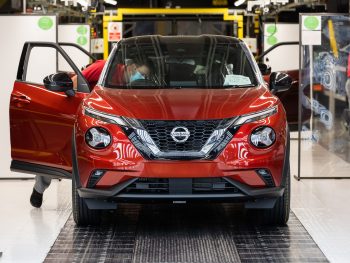UK car production falls for eighth month as chip shortage persists
UK car production in February fell 41.3% to 61,657 units, marking the weakest February for since 2009.

Car production is facing new and continued challenges, including the war in Ukraine and the chip shortage
A total of 43,351 fewer cars were made than in the same month in 2021, according to the latest figures released today by the Society of Motor Manufacturers and Traders (SMMT).
This was primarily due to the persistent global shortage of semiconductors causing some factories to pause production, and the loss of output following Honda’s closure of its Swindon plant last summer.
Production declined for both the domestic and overseas markets, down 35.8% and 41.8% respectively. Exports accounted for more than eight in 10 cars made, with the majority of shipments (62.4%) heading into the European Union, equivalent to 31,673 units. The US, in comparison, took 11.0% of exports, and China 8.7%.
In more positive news, one in four (25.8%) cars made last month was either an electric or hybrid vehicle, totalling 15,905 units. The SMMT has also published analysis this week revealing some £10.8bn has been committed to UK electric vehicle production and gigafactories since 2011.
However, the industry body said fresh commitments to domestic battery production were now essential if volumes are to grow further. The current trajectory aims to boost capacity to 41GWh by 2027 but, if the UK is to produce around one million electric vehicles a year, 60GWh will be needed.
The sector has also called for urgent action to alleviate soaring business energy costs and encourage investment.
Mike Hawes, SMMT chief executive, said: “The automotive industry is undergoing its most radical transformation in more than a hundred years, but manufacturers are simultaneously facing the most extreme operating conditions as global economic headwinds drive up costs and constrain supply. The sector entered 2022 hopeful for recovery, but that recovery has not yet begun, and urgent action is now needed to help mitigate spiralling energy costs and ensure the sector remains globally competitive to encourage the investment essential to growth, job security and the delivery of net zero ambitions.”
In particular, the industry says the Russian state’s invasion of Ukraine has brought a further challenge for the sector. Although, in 2021, Russia took just 1.1% of UK car exports and Ukraine just 0.5%, many critical raw materials, parts and components, including aluminium, palladium and nickel, which is used in battery manufacturing, and wiring harnesses, are sourced from the region.
The SMMT added: “The sanctions imposed are supported by the industry but raise additional challenges to the sector in the medium to long-term.”
KPMG has also commented on the challenges. Richard Peberdy, UK head of automotive, said: “As inflation rises, car makers face difficult decisions as they assess their own rising costs, within a landscape where consumers are being increasingly squeezed, including at the pumps and chargers.
“Car production also doubtless faces further challenges as supply chains are disrupted by the war in Ukraine. The scale of that impact is still working its way through the system, but early signs are that this will prolong the acute shortage of supply of new vehicles that we have seen over the last year. Any increase of Covid-19 restrictions in China will only further add to the complexity for car makers.”







